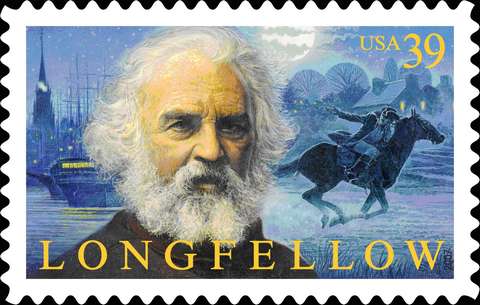
It’s the birthday of one of the best known American poets, Henry Wadsworth Longfellow (1807—1882.) Longfellow is best remembered for poems such as “The Song of Hiawatha” (1855,) “Paul Revere’s Ride” (1861), long narrative poems such as “Evangeline” (1847) and “The Courtship of Miles Standish” (1858,) and his translation of Dante Alighieri’s “Divine Comedy.” Some of his poems such as “There was a little girl” remain familiar to this day as rhymes and melodies.
For more details on Henry Wadsworth Longfellow, see bio on the Poetry Foundation’s website. I also suggest collections of his poems and writings on Amazon, or these free downloads on the Internet Archive.
Inspirational Writings of Henry Wadsworth Longfellow
Thy fate is the common fate of all,|Into each life some rain must fall,|Some days must be dark and dreary.
—Henry Wadsworth Longfellow (American Poet)
The bravest are the tenderest. The loving are the daring.
—Henry Wadsworth Longfellow (American Poet)
Let nothing disturb thee, Let nothing affright thee, All things are passing, God changeth never.
—Henry Wadsworth Longfellow (American Poet)
All things come round to him who will but wait.
—Henry Wadsworth Longfellow (American Poet)
Tomorrow is the mysterious, unknown guest.
—Henry Wadsworth Longfellow (American Poet)
Some must follow and some command, though all are born of clay.
—Henry Wadsworth Longfellow (American Poet)
Hope has as many lives as a cat or a king.
—Henry Wadsworth Longfellow (American Poet)
Look not mournfully into the Past. It comes not back again. Wisely improve the Present. It is thine. Go forth to meet the shadowy Future, without fear, and with a manly heart.
—Henry Wadsworth Longfellow (American Poet)
Let us then be what we are, and speak what we think, and in all things keep ourselves loyal to truth.
—Henry Wadsworth Longfellow (American Poet)
Let us then be up and doing,|With a heart for any fate,|Still achieving, still pursuing,|Learn to labor and to wait.
—Henry Wadsworth Longfellow (American Poet)
Lives of great men all remind us|We can make our lives sublime,|And, departing, leave behind us|Footprints on the sands of time.
—Henry Wadsworth Longfellow (American Poet)
The talent of success is nothing more than doing what you can do well, and doing well whatever you do without thought of fame. If it comes at all it will come because it is deserved, not because it is sought after.
—Henry Wadsworth Longfellow (American Poet)
Give what you have. To someone, it may be better than you dare to think.
—Henry Wadsworth Longfellow (American Poet)
Love gives itself; it is not bought.
—Henry Wadsworth Longfellow (American Poet)
Great is the art of beginning, but greater is the art of ending.
—Henry Wadsworth Longfellow (American Poet)
Perseverance is a great element of success. If you only knock long enough and loud enough at the gate, you are sure to wake up somebody.
—Henry Wadsworth Longfellow (American Poet)
Sometimes we may learn more from a man’s errors than from his virtues.
—Henry Wadsworth Longfellow (American Poet)
Kind hearts are the gardens,|Kind thoughts are the roots,|Kind words are the flowers,|Kind deeds are the fruits.||Take care of your garden|And keep out the weeds,|Fill it with sunshine|Kind words and kind deeds.
—Henry Wadsworth Longfellow (American Poet)
The greatest grace of a gift, perhaps, is that it anticipates and admits of no return.
—Henry Wadsworth Longfellow (American Poet)
Give what you have. To someone, it may be better than you dare to think.
—Henry Wadsworth Longfellow (American Poet)
He spake well who said that graves are the footprints of angels.
—Henry Wadsworth Longfellow (American Poet)
The life of a man consists not in seeing visions and in dreaming dreams, but in active charity and in willing service.
—Henry Wadsworth Longfellow (American Poet)

 Lincoln’s political and military leadership during the
Lincoln’s political and military leadership during the